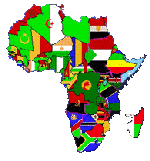From Donna Fort:
A few days ago I was home alone on an unusually quiet day and I kept hearing a strange noise. I opened the door to our tiny screened-in porch and found a crested barbet beating himself on the screen trying to get out. My presence distressed the bird so much that I went back in the house for a few minutes to try to decide what to do. It was such a beautiful bird and amazing to see its variety of colours up so close.
A little later I went back armed with a long camp spatula and spoon thinking if I opened the door to outside and guided it I could get it back outside ... but God told me just to sit and watch, so I did. The bird again was disturbed by my presence, but I sat as still as I possibly could. It kept flying back and forth and around. It landed beside the open door, above the open door, but it never went OUT the open door! I was really getting frustrated. However, I prayed that God would help the bird find his way out. Not long after that, the barbet flew to the top left corner of the screen where there was a tiny rip and squeezed his way back out into the world. I was amazed. I thought I knew how he should get out, but God and the barbet had other plans!
God spoke to me through that experience about several issues we are concerned about in Zimbabwe. Sometimes it seems that there is a very obvious answer, so obvious that NO ONE could possibly miss it, but then maybe that is not the answer or open door God has in mind. Sometimes, it is best to sit and pray - In God's Words, "Be still and know that I am God." I did what I could - I opened the door - but that is not what needed to be done.
As I was reading Donna's letter, I was listening to Brandon Heath's Give Me Your Eyes.
Give me your eyes for just one second
Give me your eyes so I can see everything that I keep missing
Give me your love for humanity
Give me your arms for the broken-hearted
The ones that are far beyond my reach
Give me your heart for the ones forgotten
Give me your eyes so I can see
Then, just as I finished my first draft, the song by Sierra, When I Let Go, came on:
I have tried to guide my circumstanceWhat an interesting confluence of messages.
But there's just no way I can.
When will I learn this lesson?
Your ways are not like mine.
Lord, help me to surrender
The control I try to have on my life.
When I let it go,
You take my hand and gently lead me
Then you let me know
Just how peaceful my life can be
When I let it go
The never ending blessings, like a river, start to flow,
When I let it go
I don't believe that Be still and know that I am God (Psalm 46:10) is intended to be an excuse for inactivity or laziness or a lack of initiative in Kingdom work. But usually (yes, tongue-in-cheek), He has a better idea about how to build His Kingdom in Africa than I have. It is God's revelation that He and He alone sees from His perspective; He and He alone knows what needs to be done; He and He alone will be exalted among the nations. The writer of Ecclesiastes said, There is a time for everything, and a season for every activity under heaven ... a time to be silent and a time to speak.... (Ecclesiastes 3:1a, 7b). We can only figure out when to be silent and when to speak when we know Him and when we spend time with Him before taking action to see what He wants us to do. That's a hard lesson for me to learn.
- How have you learned this lesson?
- Is there a time when you waited and God worked, letting you observe his exaltation?
- Is there a time when you have gotten ahead of God's plan and timing?
For the Kingdom,
Bob A
Donna Fort and her husband Gregg have served in Zimbabwe for almost 23 years. They currently live in Gweru.
Crested Barbet. Photgraphed in the Madikwe Game Reserve, South Africa. August 2008. From Wikipedia.
| This file is licensed under the Creative Commons Attribution 3.0 Unported license. | |
| Attribution: Vjosullivan at en.wikipedia |



